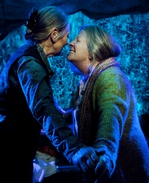SITE GUIDE
SEARCH
REVIEWS
REVIEW ARCHIVES
ADVERTISING AT CURTAINUP
FEATURES
NEWS
Etcetera and
Short Term Listings
LISTINGS
Broadway
Off-Broadway
NYC Restaurants
BOOKS and CDs
OTHER PLACES
Berkshires
London
California
New Jersey
DC
Connecticut
Philadelphia
Elsewhere
QUOTES
TKTS
PLAYWRIGHTS' ALBUMS
LETTERS TO EDITOR
FILM
LINKS
MISCELLANEOUS
Free Updates
Masthead
Writing for Us
A CurtainUp  London Review
London Review
 London Review
London ReviewSalt, Root and Roe
|
Thatís the Welsh for you. See a bloody tragedy. Like a family drowning a young girl for falling in love with the wrong man and the bloody sing a song about it. — Iola
|

Anna Carteret as Anest and Anna Calder-Marshall as Iola (Photo: Bronwen Sharp) |
The play opens with the arrival of Anestís anxious daughter Menna (Imogen Stubbs) who lives in Bristol and who has come in response to a disturbing letter from her Aunt Iola. The letter seemed like a suicide note and Menna has alerted the local police in the shape of family friend, Gareth (Roger Evans). The cottage is deserted and the twins have got rid of most of their furniture.
We have seen the two women, playing, like children twirling round, joined to each other with a skipping rope, pretending they are back swimming in their motherís womb. It seems that Auntie Iola is having periods of dementia and these are responsible for her erratic behaviour which manifests itself when she puts Mennaís mobile phone into a teapot full of tea. This is funny and disconcerting but Menna is surprisingly tolerant as she frantically tried to get her phone to work while making reassuring noise to her aunt.
In old age, as in childhood, the women live together, without their father who Iola poetically describes as a merman. What Price has done, which is exceptional, is to juxtapose the challenges of old age, and indeed Mennaís unhappy marriage to an obsessive, next to a poetry that celebrates the Welsh natural seascape that the sisters live in. So the play is full of quirkiness and human frailty, realistic yet hopeful because of the ethereal, fantasy world that Iola inhabits. We see early in the play how Anest can calm the worst rages of her twin, which makes Iolaís later lack of recognition of Anest all the more tragic, as she lapses into profanity and unintended cruelty towards those that love her most.
The director Hamish Price has recognised the playís delicacy and his direction is tender. Chloe Lamfordís set has the few sticks of simple furniture left in the cottage, the twinsí bed, a garden bench but a wall and ceiling of grey stained, dappled, gathered fabric allows Anna Watsonís lighting to shine through the bulging cloth to create a magical world with the sound of the waves crashing on the shore. There is a model of a cottage in a fish tank on the sea shore.
The performances are enthralling. There is Imogen Stubbs as Menna, wearing her latex gloves, even in bed, damaged in a marriage to a controlling man with a mania for cleanliness. The man who gave her a bottle engraved with the words "Soulmate" but containing unromantic sanitiser. Menna is delightfully matter of fact and open with what she is thinking. She has a transparent honesty which Imogen Stubbs conveys precisely and allows us to laugh. There is a lovely scene when Gareth and Menna talk about wanting to be a twin and Menna says she wanted to be one of three twins. Gareth suggests"Triplets". "I wanted to be a twin" says Menna emphatically and wide eyed with a strong Welsh accent. Anna Calder-Marshallís Iola is endearing and of course she shocks with the rages of dementia. Anna Carteretís Anest is a grounding, practical figure, fondly caring for the decline of her sister and of course seeing in her, her own probable future. The twins dress alike and their grey, plaited hair is the same but they have to act convincingly together because their height is very different. Roger Evansí Gareth is the only man in the play, a reliable, local man, the same age as Menna who tells us all about his marriage and is the device for us to learn about Menna.
Artistic directors will be getting in line for Tim Priceís third play!
|
Subscribe to our FREE email updates with a note from editor Elyse Sommer about additions to the website -- with main page hot links to the latest features posted at our numerous locations. To subscribe,
E-mail: esommer@curtainup.comesommer@curtainup.com
put SUBSCRIBE CURTAINUP EMAIL UPDATE in the subject line and your full name and email address in the body of the message -- if you can spare a minute, tell us how you came to CurtainUp and from what part of the country. |
| Salt, Root and Roe
Written by Tim Price Directed by Hamish Pirie Starring: Imogen Stubbs, Anna Calder-Marshall, Anna Carteret, Roger Evans Designed by Chloe Lamford Lighting: Anna Watson Composer and Sound: Alex Baranowski Running time: One hour 40 minutes without an interval Box Office: 0844 871 7627 Booking to 3rd December 2011 Reviewed by Lizzie Loveridge based on 15th November 2011 performance at Trafalgar Studios Two, Whitehall, London SW1A 2DY (Tube: Charing Cross) |
|
REVIEW FEEDBACK Highlight one of the responses below and click "copy" or"CTRL+C"
Paste the highlighted text into the subject line (CTRL+ V): Feel free to add detailed comments in the body of the email . . . also the names and emails of any friends to whom you'd like us to forward a copy of this review. |




